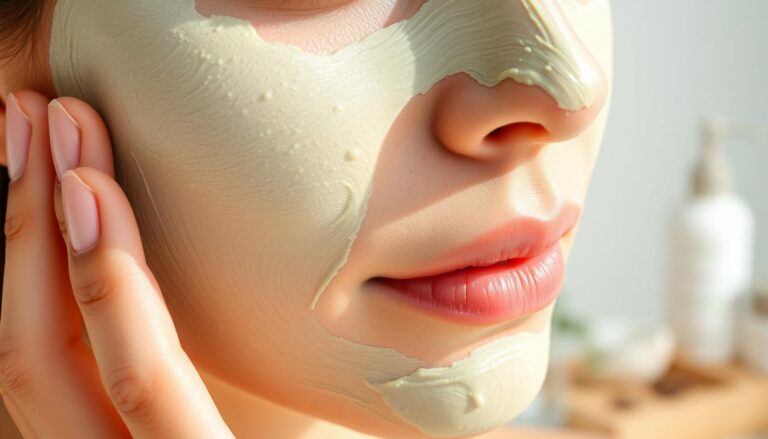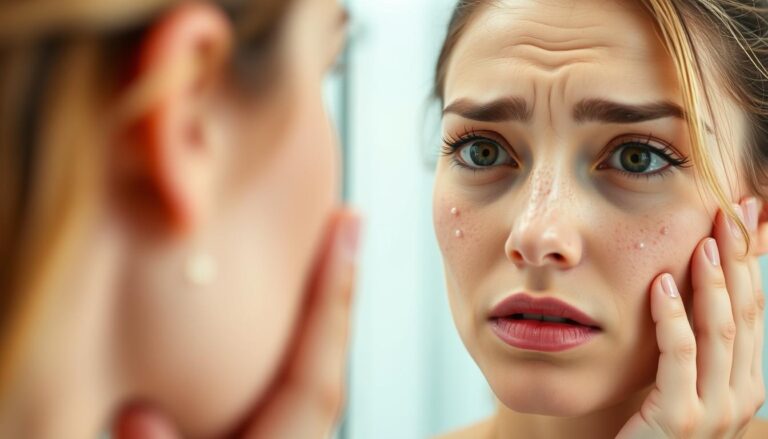At Glowskinhub.com, we believe beauty isn’t just a look—it’s a feeling
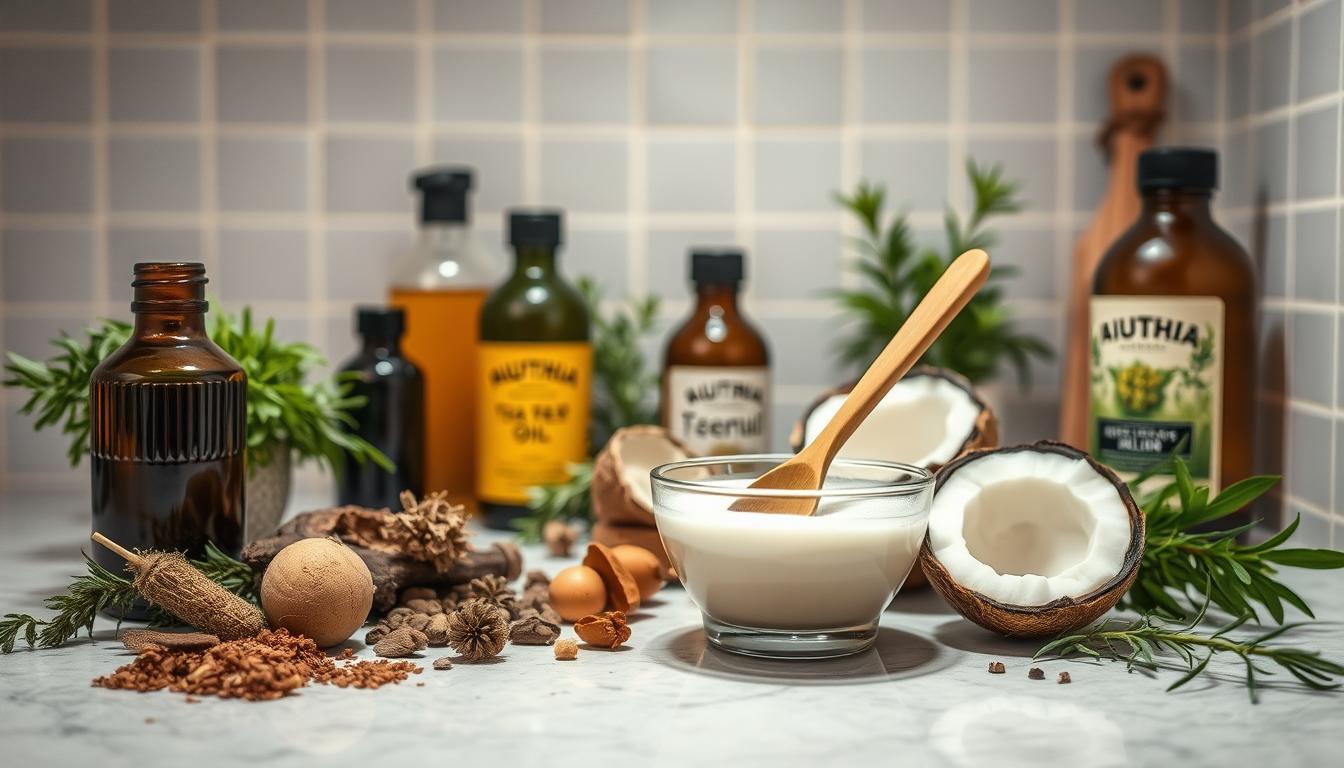
5 home remedies for itchy scalp that actually work
Dealing with an itchy scalp can be frustrating and embarrassing. It’s a common issue that affects many people, causing discomfort and distress. Fortunately, there are effective solutions that can be found right in your own home.
An itchy scalp can be caused by a variety of factors, including dry Skin, dandruff, and sensitivity to Hair Care products. Whatever the reason, it’s essential to find a remedy that works for you. In this article, we’ll explore some simple and effective home remedies to soothe an itchy scalp.
These remedies are not only easy to try but have also been proven to provide relief. By incorporating some simple changes into your Hair Care routine, you can say goodbye to an itchy scalp and hello to a healthier, happier you.
Key Takeaways
- Simple home remedies can provide effective relief from an itchy scalp.
- Identifying the cause of the itchiness is crucial for finding the right solution.
- Natural ingredients can be used to soothe and calm the scalp.
- Making a few simple changes to your Hair Care routine can make a big difference.
- Relief from itchiness can be achieved without resorting to harsh chemicals.
Understanding Itchy Scalp: Causes and Symptoms
An itchy scalp is not just a nuisance; it’s a condition that warrants understanding and attention. The scalp, being a sensitive area, can be prone to various irritations and conditions that lead to itchiness.
Common Causes of Scalp Itchiness
Several factors contribute to scalp itchiness, including dry Skin, dandruff, eczema, and psoriasis. Even an oily Skin routine can sometimes exacerbate the issue if not managed properly, as excessive oil can clog pores and irritate the scalp.
| Cause | Description | Associated Symptoms |
|---|---|---|
| Dry Skin | Lack of moisture leading to dryness | Tightness, flakiness |
| Dandruff | Fungal infection causing flakes | White flakes, redness |
| Eczema | Inflammatory condition | Redness, itching, inflammation |
Recognising Symptoms Beyond Itching
Beyond the itch, symptoms can include redness, flaking, and irritation. Recognising these symptoms is crucial for determining the underlying cause.
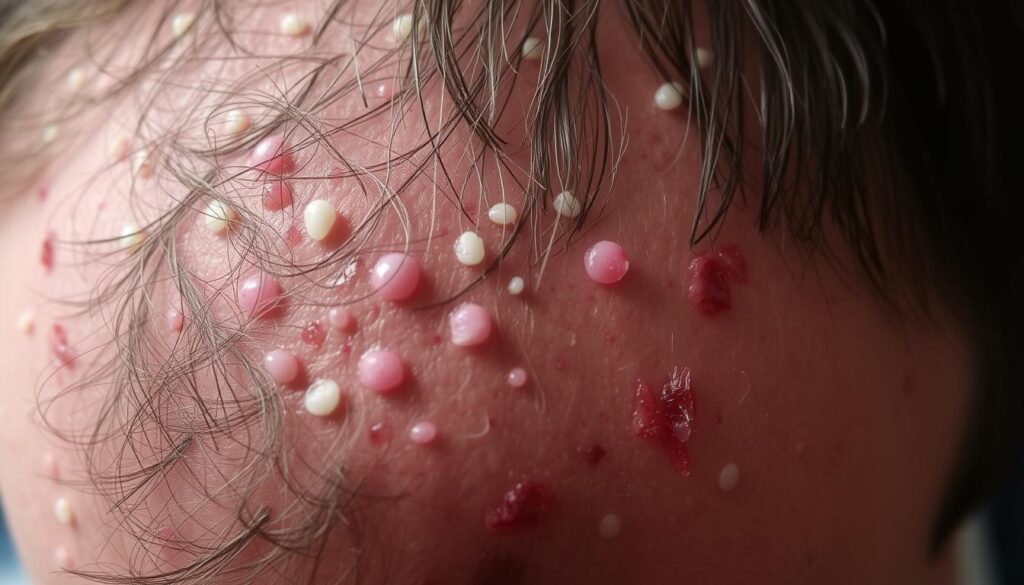
Different Types of Scalp Conditions
Scalp conditions range from mild irritations to more serious diseases like psoriasis. Understanding the specific condition is key to effective treatment.
By understanding the causes, symptoms, and types of scalp conditions, individuals can better navigate the path to relief from itchy scalp.
Why Traditional Treatments Sometimes Fall Short
The limitations of traditional treatments for itchy scalp are becoming increasingly apparent, prompting a search for alternative solutions. Despite the wide range of commercial shampoos and treatments available, many individuals continue to experience persistent itchiness and discomfort.
Limitations of Commercial Shampoos and Treatments
Commercial shampoos and treatments often provide temporary relief but can fail to address the underlying causes of itchy scalp. Some products may even exacerbate the condition due to harsh ingredients that strip the scalp of its natural oils, leading to dryness and irritation.
Harmful Ingredients to Avoid
Certain ingredients in commercial products, such as sulfates and parabens, can be particularly detrimental to scalp health. Sulfates, for example, can strip the hair and scalp of natural oils, while parabens have been linked to various health concerns. Opting for products that avoid these harsh chemicals is a step towards healthier scalp care.
The Case for Natural Remedies
Natural remedies offer a gentler, more sustainable approach to managing itchy scalp.
“Natural treatments can provide effective relief without the harsh side effects associated with some commercial products.”
Ingredients like tea tree oil, aloe vera, and coconut oil have been praised for their soothing and healing properties.
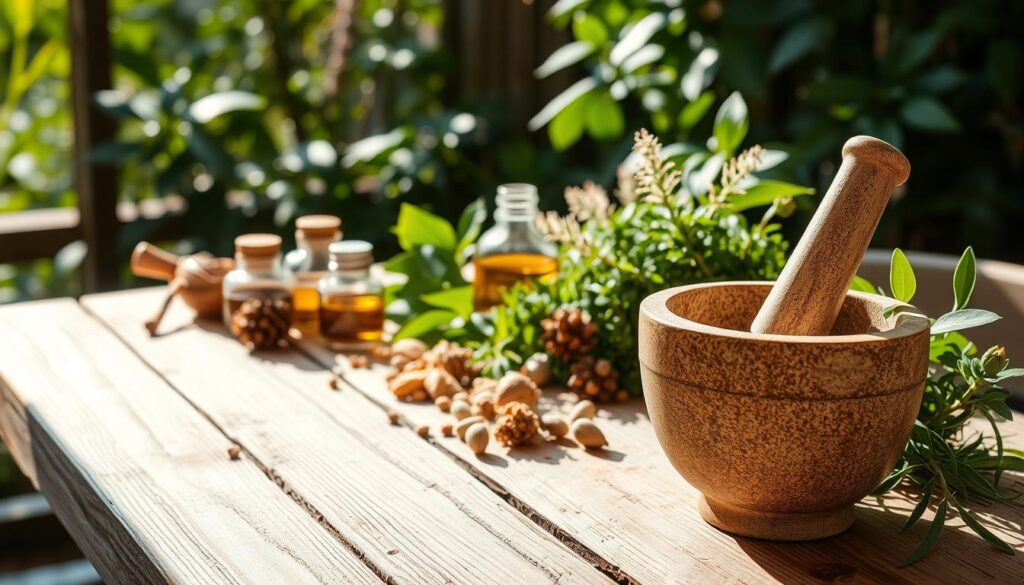
By understanding the limitations of traditional treatments and exploring the benefits of natural remedies, individuals can take a more informed approach to managing their itchy scalp conditions.
5 Home Remedies for Itchy Scalp That Actually Work
Finding relief from an itchy scalp can be as simple as trying these five home remedies. An itchy scalp can be caused by a variety of factors, including dryness, fungal infections, and sensitivity to Hair Care products. Fortunately, nature has provided us with effective solutions that are easy to implement at home.
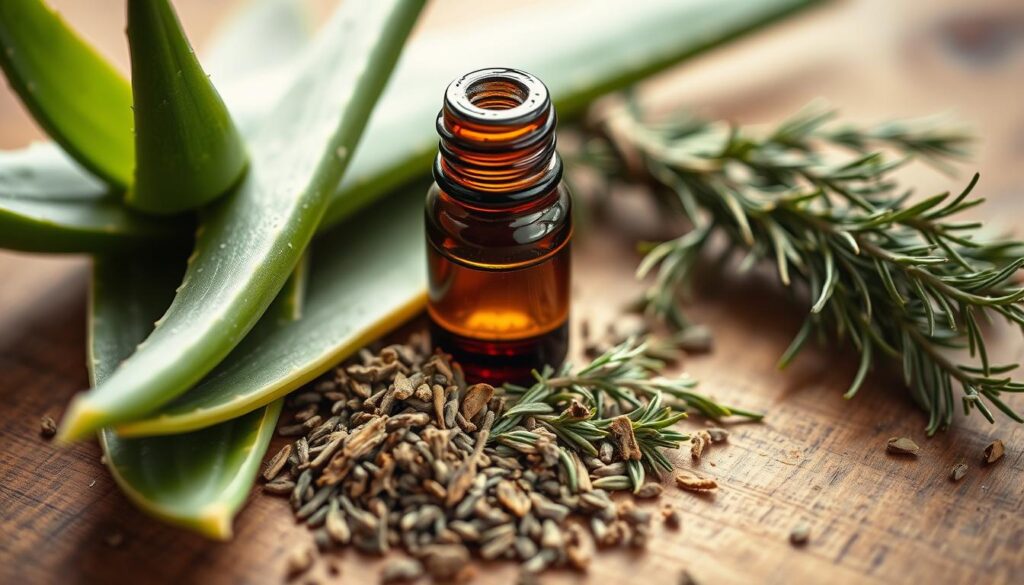
The Science Behind Natural Treatments
Natural remedies work by addressing the underlying causes of itchiness. For instance, antifungal properties help combat infections, while moisturising properties soothe dry scalps. Understanding the science behind these remedies can help you make informed decisions about your scalp care.
How These Remedies Target Different Causes
Different remedies target different causes of itchiness. For example, tea tree oil is known for its antifungal properties, making it ideal for fungal infections. On the other hand, coconut oil deeply moisturises, providing relief for dry scalps. By identifying the cause of your itchiness, you can choose the most effective remedy.
Setting Realistic Expectations
While these remedies are effective, it’s essential to have realistic expectations. Results may vary, and it may take some trial and error to find the right remedy for your specific condition. Consistency and patience are key to achieving relief from an itchy scalp.
Tea Tree Oil: Nature’s Antifungal Solution
For those struggling with an itchy scalp, tea tree oil offers a natural solution with its inherent antifungal and anti-inflammatory benefits.
Antimicrobial and Anti-inflammatory Benefits
Tea tree oil is renowned for its antimicrobial properties, which help combat fungal and bacterial infections that can lead to an itchy scalp. Its anti-inflammatory benefits also soothe irritation, reducing redness and discomfort.
Key Benefits:
- Antifungal properties to combat infections
- Anti-inflammatory effects to reduce irritation
- Natural and gentle on the scalp
How to Use Tea Tree Oil Safely on Your Scalp
To use tea tree oil effectively, it’s crucial to dilute it properly to avoid irritation.
Proper Dilution Guidelines
Mix a few drops of tea tree oil with a carrier oil like coconut or olive oil. A typical dilution ratio is 3 drops of tea tree oil per 1 tablespoon of carrier oil.
DIY Tea Tree Oil Scalp Treatment Recipe
Create a scalp treatment by mixing tea tree oil with a carrier oil and gently massaging it into your scalp. Leave it on for at least 30 minutes before shampooing.
| Ingredient | Quantity | Purpose |
|---|---|---|
| Tea Tree Oil | 3 drops | Antifungal and Anti-inflammatory |
| Coconut Oil | 1 tablespoon | Carrier Oil |
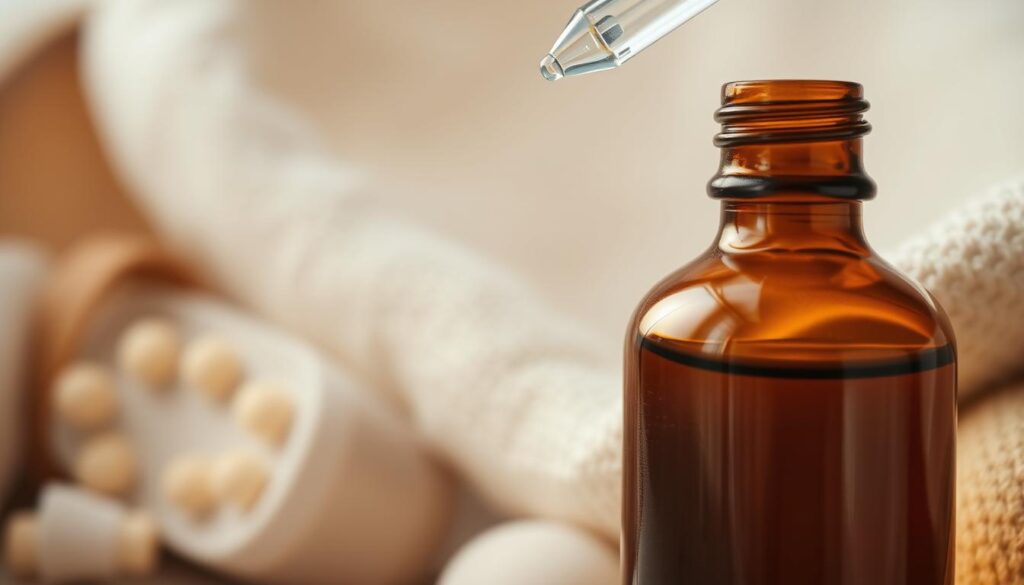
By incorporating tea tree oil into your scalp care routine, you can effectively manage itchiness and promote a healthier scalp.
Apple Cider Vinegar: Balancing Scalp pH
Restoring the natural balance of the scalp’s pH is crucial for reducing itchiness, and apple cider vinegar is proving to be a valuable remedy. An imbalanced scalp pH can lead to irritation and itchiness, making it essential to find a natural and effective solution.
Restoring Natural Balance
Apple cider vinegar helps to restore the scalp’s natural pH balance due to its acidic nature. This acidity helps to counteract the alkalinity that can cause irritation and itchiness. By using apple cider vinegar as a rinse, individuals can help maintain a healthy scalp environment.
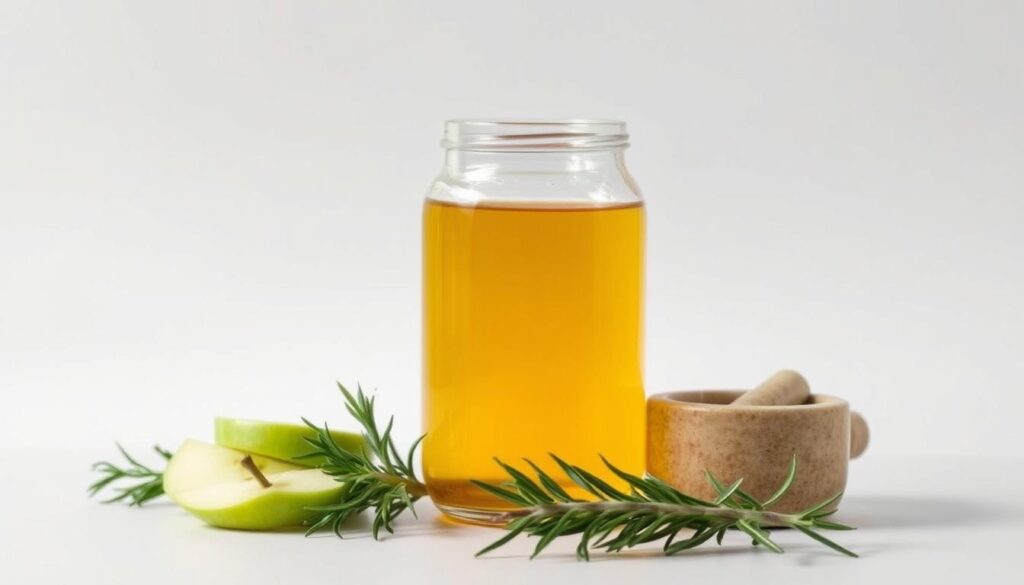
Step-by-Step ACV Rinse Guide
To effectively use apple cider vinegar as a scalp treatment, it’s essential to follow a simple step-by-step guide. First, mix the apple cider vinegar with water, taking care to dilute it appropriately to avoid irritation.
Correct Dilution Ratios for Sensitive Scalps
For those with sensitive scalps, a dilution ratio of 1 part apple cider vinegar to 2 parts water is recommended. This can be adjusted based on individual tolerance.
Application Technique and Frequency
Apply the diluted apple cider vinegar mixture to the scalp after shampooing, massaging it in gently before rinsing thoroughly with warm water. This treatment can be used once or twice a week, depending on the severity of the itchiness.
By incorporating apple cider vinegar into their scalp care routine, individuals can potentially reduce itchiness and promote a healthier scalp environment.
Aloe Vera: Soothing Inflammation and Irritation
For centuries, aloe vera has been revered for its soothing properties, making it an ideal solution for irritated scalps. Its gel contains a plethora of vitamins, minerals, and amino acids that contribute to its healing properties.
Cooling and Healing Properties for Irritated Scalps
Aloe vera’s anti-inflammatory and antimicrobial properties make it an effective remedy for reducing redness and irritation on the scalp. It helps in calming the scalp, thereby reducing itchiness and discomfort.
Extracting and Applying Fresh Aloe Vera
To use aloe vera, one can extract the gel directly from the leaf of the aloe vera plant. Simply cut open the leaf, scoop out the gel, and apply it directly to the scalp. Alternatively, aloe vera gel can be purchased from health stores or online.
Aloe Vera and Essential Oil Blend Recipe
For an enhanced treatment, you can blend aloe vera gel with a few drops of tea tree oil or lavender oil. This blend not only soothes the scalp but also provides antifungal benefits.
- Mix 2 tablespoons of aloe vera gel with 5 drops of tea tree oil.
- Apply the mixture to the scalp and massage gently.
- Leave it on for at least 30 minutes before rinsing.
Application and Treatment Duration
For optimal results, apply the aloe vera gel or the aloe vera and essential oil blend to the scalp 2-3 times a week. Consistency is key to seeing improvements in scalp health.
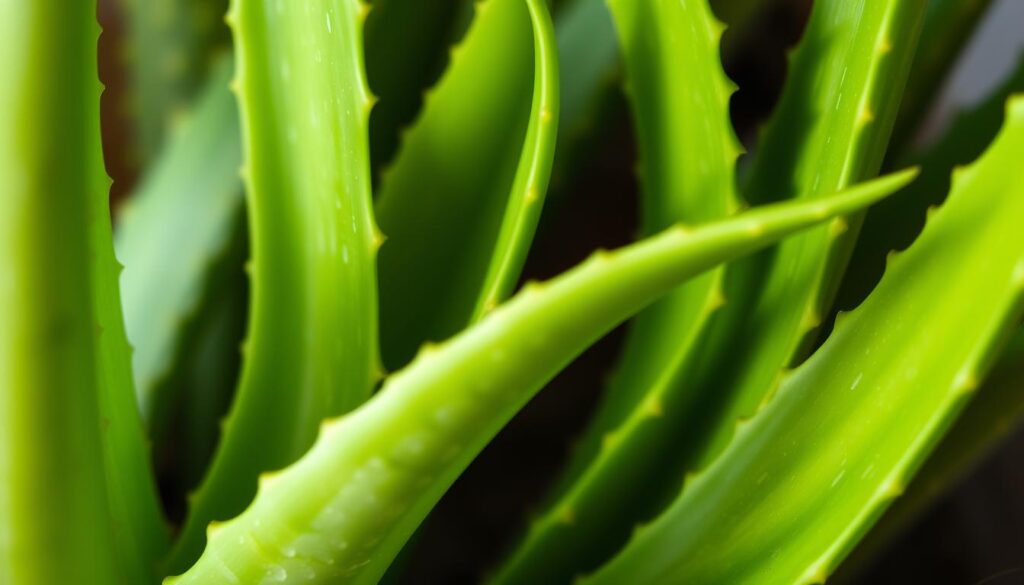
By incorporating aloe vera into your scalp care routine, you can leverage its natural soothing properties to combat itchiness and irritation, promoting a healthier scalp environment.
Coconut Oil: Deep Moisturising Treatment
Moisturising is key to alleviating itchy scalp, and coconut oil is a potent moisturiser. Its rich composition of fatty acids provides intense hydration, helping to combat dryness and flaking associated with various scalp conditions.
How Coconut Oil Combats Dryness and Flaking
Coconut oil’s moisturising properties are attributed to its high content of medium-chain fatty acids, particularly lauric acid, which has antimicrobial properties. These components help to nourish the scalp, reducing flakiness and itchiness.
Selecting the Right Type of Coconut Oil
When choosing coconut oil for scalp treatment, it’s essential to opt for virgin or cold-pressed coconut oil. These types are less processed, retaining more nutrients and offering better moisturising benefits.
Overnight Coconut Oil Treatment Method
For an intense moisturising treatment, apply coconut oil generously to the scalp, massaging it in to stimulate blood flow. Leave it on overnight and wash off with a gentle shampoo in the morning.
Proper Washing Techniques to Prevent Greasiness
To avoid greasiness, use a mild shampoo and warm water to rinse the coconut oil off. Gentle massaging while rinsing can help remove excess oil. For oily scalps, consider using a clarifying shampoo periodically.
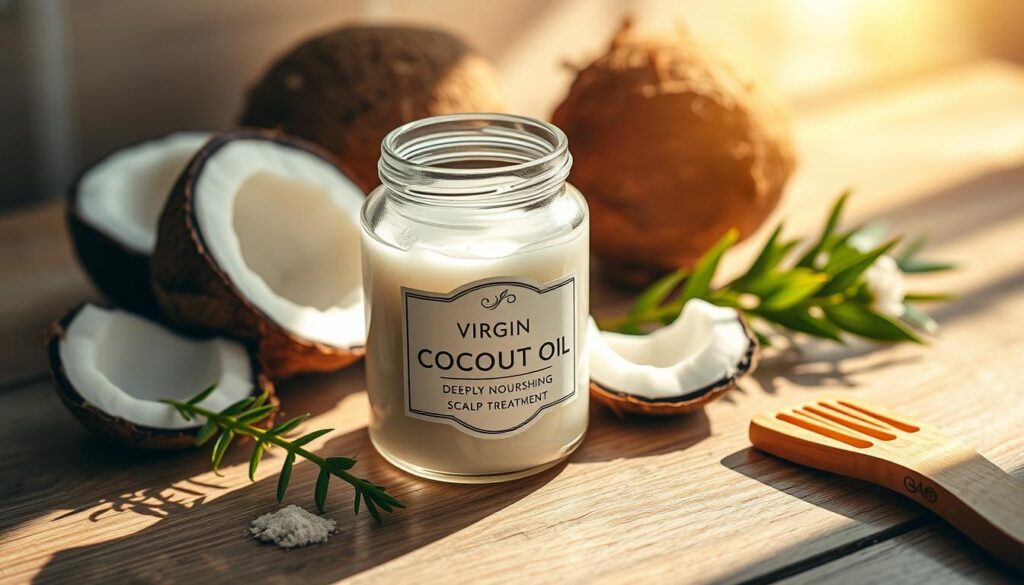
Witch Hazel: Reducing Inflammation and Itchiness
The astringent properties of witch hazel make it an effective treatment for itchy scalp. Witch hazel has been used for centuries to soothe various Skin irritations, and its anti-inflammatory properties can provide significant relief for scalp issues.
Astringent Properties That Calm Irritated Scalps
Witch hazel’s astringent properties help in reducing inflammation and itchiness by tightening the Skin and reducing irritation. This makes it particularly beneficial for individuals dealing with oily Skin, as it can help balance the scalp’s natural oils. When looking for best products for oily Skin, incorporating witch hazel can be a wise decision.
Creating a Witch Hazel Scalp Spray
Creating a witch hazel scalp spray is a straightforward process that can be customized to suit individual needs.
Ingredients and Preparation Steps
To make a witch hazel scalp spray, you’ll need witch hazel extract, distilled water, and a few drops of lavender essential oil (optional). Mix 1 part witch hazel with 2 parts distilled water in a spray bottle. Add a few drops of lavender oil for its calming effects, if desired. Shake the bottle well before each use.
Application Frequency and Best Practices
Spray the witch hazel mixture onto the scalp, massaging it gently. Use this spray 2-3 times a week as part of your oily Skin treatment routine. For best results, leave it on for at least an hour before washing your hair. As one expert notes,
“Witch hazel can be a game-changer for scalp health, offering a natural and effective solution.”
Combining Remedies for Enhanced Results
A multi-faceted approach, involving the combination of natural remedies, may yield better results for itchy scalp sufferers. By understanding how to combine these remedies effectively, individuals can potentially enhance their treatment outcomes.
Compatible Remedy Combinations
Certain natural remedies can be combined to great effect. For instance, tea tree oil’s antifungal properties can be paired with the soothing effects of aloe vera. Similarly, apple cider vinegar’s pH-balancing capabilities can complement the moisturising effects of coconut oil.
| Remedy 1 | Remedy 2 | Benefits of Combination |
|---|---|---|
| Tea Tree Oil | Aloe Vera | Combats fungal infections while soothing irritation |
| Apple Cider Vinegar | Coconut Oil | Balances scalp pH while moisturising |
When combining remedies, it’s essential to start with small amounts and monitor the scalp’s response to avoid any adverse reactions.
Creating a Weekly Scalp Treatment Schedule
To maximise the benefits of these natural remedies, creating a weekly treatment schedule can be beneficial. For example, one could use a tea tree oil shampoo twice a week, apply an aloe vera mask once a week, and perform an apple cider vinegar rinse every other week.
Customising Treatments for Your Specific Condition
It’s crucial to tailor these treatments based on the specific scalp condition. For instance, those with oily scalps might benefit from more frequent apple cider vinegar rinses, while individuals with dry scalps might need more moisturising treatments like coconut oil masks.
By combining these natural remedies and customising their use based on individual scalp conditions, individuals can potentially achieve more effective relief from itchiness and other scalp issues.
Preventative Measures for Long-Term Scalp Health
Maintaining a healthy scalp requires a multi-faceted approach that includes dietary adjustments, proper Hair Care habits, and awareness of environmental factors. By adopting these preventative measures, you can significantly reduce the occurrence of itchiness and other scalp issues.
Dietary Changes That Support Scalp Health
A well-balanced diet rich in vitamins and minerals is crucial for scalp health. Foods high in omega-3 fatty acids, zinc, and vitamin B can help nourish your scalp. Incorporating these nutrients into your diet can be achieved by consuming foods such as salmon, walnuts, and leafy greens.
| Nutrient | Benefit | Food Sources |
|---|---|---|
| Omega-3 Fatty Acids | Nourishes scalp, reduces inflammation | Salmon, walnuts, chia seeds |
| Zinc | Supports healing, regulates oil production | Oysters, beef, chicken |
| Vitamin B | Promotes healthy hair growth, reduces dandruff | Leafy greens, eggs, whole grains |
Hair Care Habits to Prevent Recurring Itchiness
Using gentle, sulphate-free shampoos and conditioners suitable for your scalp type can help prevent irritation. Regularly washing your hair without over-washing, and avoiding harsh chemical treatments can also contribute to a healthier scalp.
Environmental Factors to Consider
Environmental factors such as pollution, humidity, and exposure to harsh weather conditions can affect scalp health. Using protective measures like hats or scalp serums with SPF can help shield your scalp from damage.
By making these simple adjustments to your lifestyle and Hair Care routine, you can promote long-term scalp health and reduce the likelihood of itchiness and irritation.
When to Consult a Healthcare Professional
It’s crucial to recognise when an itchy scalp requires more than just home remedies. While many cases can be managed with natural treatments, certain conditions necessitate professional medical attention.
Warning Signs That Require Medical Attention
Some symptoms indicate a more serious underlying condition. These include:
- Severe itching that persists despite treatment
- Visible signs of infection such as redness, swelling, or pus
- Hair loss or bald patches
- Scalp lesions or sores
Finding the Right Specialist for Scalp Issues
For issues related to the scalp, you may need to consult a dermatologist. When searching for a specialist, consider their experience with scalp conditions and patient reviews.
| Specialist Type | Areas of Expertise |
|---|---|
| Dermatologist | Skin, hair, and scalp conditions |
| Trichologist | Hair and scalp disorders |
Questions to Ask During Your Appointment
To make the most of your consultation, prepare a list of questions. These might include:
- What is the underlying cause of my itchy scalp?
- What treatment options are available?
- Are there any lifestyle changes that can help manage my condition?
By understanding when to seek medical help and how to navigate the healthcare system, you can effectively manage your itchy scalp and prevent future issues.
Conclusion
An itchy scalp can be a persistent and frustrating issue, but the five home remedies discussed offer effective relief. By incorporating tea tree oil, apple cider vinegar, aloe vera, coconut oil, and witch hazel into your scalp care routine, you can alleviate itchiness and promote a healthy scalp. These natural treatments target various causes of scalp irritation, from fungal infections to dryness and inflammation.
To achieve optimal results, consider combining these remedies and maintaining a consistent scalp care regimen. Additionally, adopting a balanced diet and being mindful of your Hair Care habits can help prevent recurring itchiness. For individuals with oily Skin, incorporating a suitable oily Skin regimen can also contribute to overall scalp health.
By taking a holistic approach to scalp care, you can enjoy a healthier, itch-free scalp and reduce the risk of associated conditions. Explore these natural remedies and start your journey towards a more balanced scalp.

